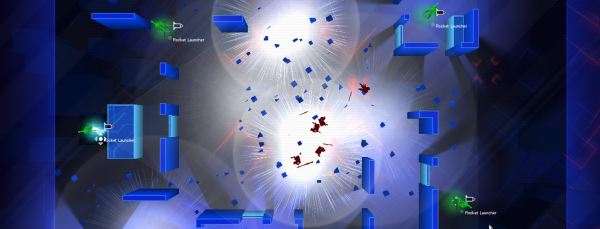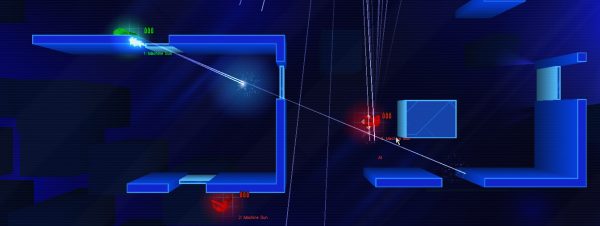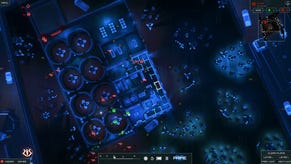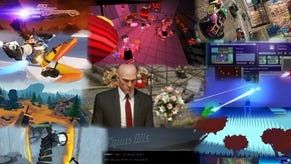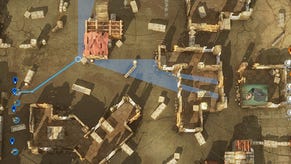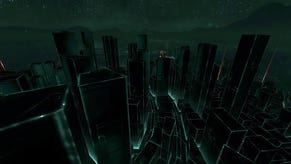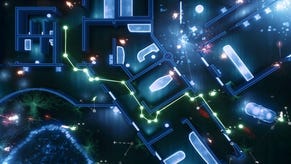Preview: Frozen Synapse
Give me 1200 words. I'm going to make you pre-order something you've never even heard of.
Well, I'm going to give it a shot anyway. Frozen Synapse is the second game from Mode 7 Games, the British Indie behind the innovative but overambitious wire-fu sword-fighting game Determinance. It's basically the logical collision between Laser Squad Nemesis, Poker and Contract Bridge, complete with a beautiful post-Introversion retro-future aesthetic. Plus tiny flashes of Worms and classic-era Rainbow Six. And other stuff.
Here's the trailer, which highlights a lot of its merits.
Much like Laser Squad Nemesis – which, if you don't know, is what the Gollops did after being burnt by the mainstream industry with X-COM – each player controls a small group of soldiers. Both players – either human or AI – give orders, which play out simultaneously. Repeat until everyone is dead. Frozen Synapse differentiates itself with its speed. While abstractly a play-by-e-mail game, the turns are so pacy and the games so short, you'll probably play them simultaneously. This where the card-game influence comes in; the games cut directly to the action and puts you in a tactical situation that demands immediate life-or-death decisions rather than turns of cautious exploration. In basic play, both sides get a random selection of weapons. The level is also randomly generated. As are the soldier's positions. While line-of-sight kicks in later, you initially know all your opposition's starting placs. In other words, you're immediately put in a position where decisions are critical, demanding you work out what on earth the opposition is going to do. Like poker, it's a game about being dealt a hand and then working out what on earth you want to do with it.
Its smartest move is cutting that randomness – which should give the game its variety – with mathematical precision in the actual combat. Like the early Rainbow Six, you plan out your orders for the turn via waypoints, and can press play to see them in action. Unlike Rainbow Six – and Laser Squad Nemesis – there's no random chance of missing. If you select the angle for your rocket-launcher to go flying through space, it's not going to deviate and blow yourself up. Since there's so much in the set-up which is unpredictable, the precision here strikes me as key. You're even able to actually enter in orders for your opponent when planning. So, if you think the opposition's soldier is going to do a certain thing, you can make that little fella do that and see if your soldiers' action will take him out. In other words, if you actually do know what they're going to do, you're going to be able to work out the absolute perfect counter. The game, of course, is working out exactly what that is.
And in a handful of turns at most later, it's all over. Buildings are rubble. Corpses are everywhere. Someone's a winner, and it's time for another game.
There's all manner of player-ranking stuff - cutely, there's a ladder based on strings-of-victory, which is very much an all-or-nothing high-turn-over of who's actually best - the most inspired game mode is defence, a more advanced approach than standard skirmishes. After the level generates, in an approach shamelessly lifted from Contract Bridge, each player takes turns to say how much of the level they think they can prevent their opponent from entering. So, if there's a long open stretch on the right and you have a sniper, you may figure you can position the camping bastard at the top and just pick 'em off. Whoever bids the most – as in, thinks they can keep the most territory, has to do it.
As well as adding another strategic level to the game, it's cleverness is that it side-steps the major problem with auto-generation. That is, making the computer create levels that are fair to both sides. By handing over the balancing to the player, it ceases to be a problem. This is classic indie thinking – turning a drawback into a strength. A level is tricky to defend? Players, if they have any sense, bid that they can hold onto less. Set up perfectly for mowing down the oncoming troops? Players say they can defend pretty much everything – and if they don't bid as much as they think is feasible, it's their opponent who's going to get the chance to reap the rewards. And if your challenge is nearly impossible... well, it's the player's fault for bidding stupidly.
Having only played a couple of games in the pub on Mode 7's laptop, I'm in love with both the potential and the actuality of this. And I can play it right now. Their current plans are a little Mount & Blade – as in, if you pre-order the game, you gain access to the multiplayer beta immediately. In the coming months, as well as improving the MP experience based on feedback – seeing Paul scribbling down my point that adding a “turns since this sighting was made” marker to the figures would be helpful shows how responsive they are – they're working on the full single-player component of the game. Now, it's puzzles and AI-skirmish, but they're planning to integrate something with a lot more narrative. Personally, were I them, I'd go systemic and jump into the hole created by the lack of a faithful X-COM... but I'm excited to see whatever they make. But the key thing is that I'm excited by what already exists, almost don't care if any Single-player ever gets made and am drumming my fingers until my Beta key arrives so I can take on Alec in devastating hyper-speed tactical battles. Expect micro-reports forthcoming, especially because you can upload your games to Youtube with a single click. Instant bragging.
(In fact, between the ghost modes, the replay uploads and general slickness, I'm tempted to say something like “Indie-strategy's answer to StarCraft 2”. Though if Mode 7 quote that out of context, I'll punch them on their communal nose.)
The pre-order starts today, for 17 quid, 19 Euros and 26 dollars. Which is leaning towards the top end of the indie, especially for a pre-order. However, when you pay, you actually get a second code to give to a friend. In other words, it's effectively eight quid fifty. That's got to tempt you.
What could go wrong? Well, the game could be enormously buggy and crash all the time, but seemed impressively slick from my brief experience. The team may all die from Iceandic-Ash-provoked pneumonia, and the game will never get completed. The final complete Single-player campaign may be nob... but, as said, that doesn't take anything away from the multi-player. Oh – and it may actually not have as much variety as you'd hope from the random generation system. I've only played a couple of games, after all. But only time is going to tell on that one, and the games I've played are enough to make me want to play more. In fact, need to play more. The main reason I'm writing it as effusively as I am, is a note to self. If there's someone like me out there, he or she would want to get in on this early.
Most of all, this reminds me of one of the very first interviews with a game developer I ever read. It was with Julian Gollop in – I believe – Your Sinclair, talking about how he hated that strategy games have this stuffy reputation. He couldn't see there was a reason why you couldn't make one which played with the pace of an arcade game, without losing any of its intrinsic intelligence. And with Rebelstar, Chaos and Laser Squad, he proved it.
Frozen Synapse screams 21st Century Gollop, and I think you're going to love it.
